Parabolic movement
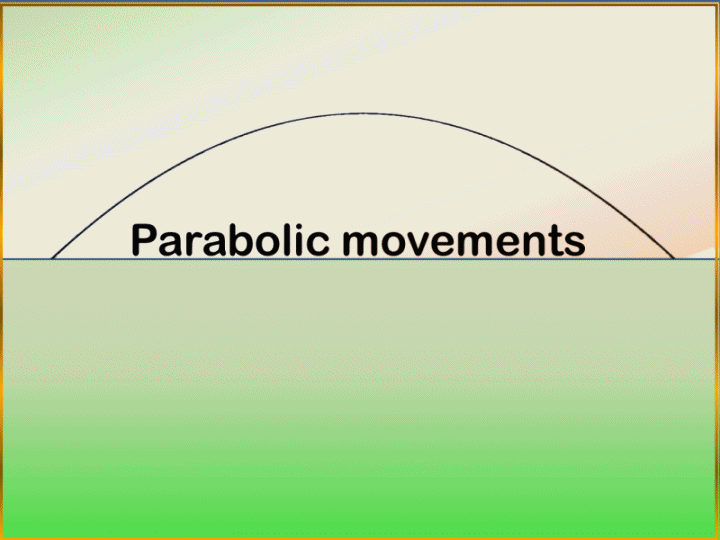
Introduction
The phenomenon of movement can be found in any part of our universe, as well as in any part of our body, this phenomenon is essentially determined by the path that a particular particle, body or object travels, that is, a motive, therefore, there are many paths recognized by each of us and this time we will analyze the mobility described by the geometric place of a parabola.
Physical science, we can express that it has undoubtedly nourished its own roots, among which we find kinematics, and this has provided us with the fundamental or elementary principles of the well-known phenomenon of movement, regardless of the type of force that originates it.
With the previous publication we began to know the fundamental bases of this phenomenon through the circular movement, which represents a mobility that belongs to the family of the curvilinear movements as well as the movement that we will be studying on this occasion, the parabolic movement.
Many of our daily activities have the influence of this type of movement, but before delving into this characteristic it is necessary to know in a general way the geometric place that allows us to identify this type of movement, that is, the parable, this figure gives us we can constantly find around us, since it has been able to combine with important areas of the human being.
Each and every one of us can exemplify or describe this type of mobility, since something such normal as traveling a certain highway could represent in one of its sections a parabolic movement, this is because many of our highways have been built on mountainous formations that impregnate our vehicles with parabolic mobility, to name just one example, but in this publication we will be meeting other examples that represent this parabolic phenomenon.
Parabolic movement
This type of phenomenon generally represents the movement of a particular particle, body or object (mobile) which describes in its trajectory or path the geometric place of a parabola, this mobility can be analyzed from an association vision between two types of movements, if we observe the projection of said parabolic path on the X axis (which is parallel to the ground) we can notice that it describes a uniform rectilinear movement, but when rising and obviously falling, said particle, body or object will describe a path projected on the Y axis, in the form of a uniformly accelerated rectilinear movement, whose acceleration is gravity, as we can see in Figure 1.
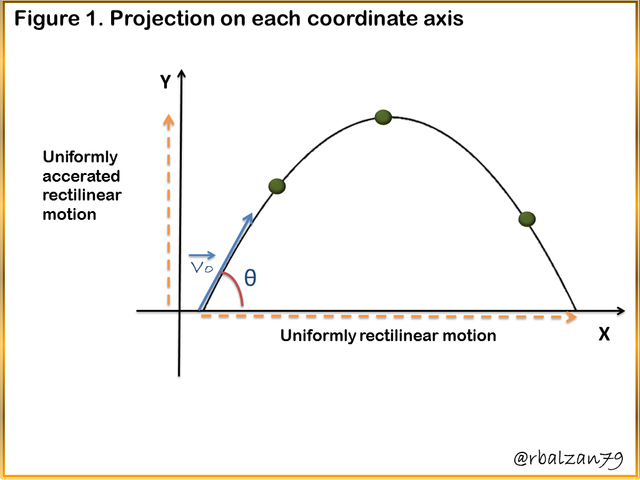
Parable
know some type of image or form related to the geometric figure of the parabola, therefore, said figure represents the geometric place, where, a certain point of the rectangular Cartesian plane has movement in such a way that its distance to a motionless line (guideline) will always be equal to the length at a fixed point (focus) of said coordinate plane, taking into account that this last point does not belong to said motionless line or guideline.
Expressed the previous thing we know some outstanding elements in this geometric figure as they are shown in the following figure 2.
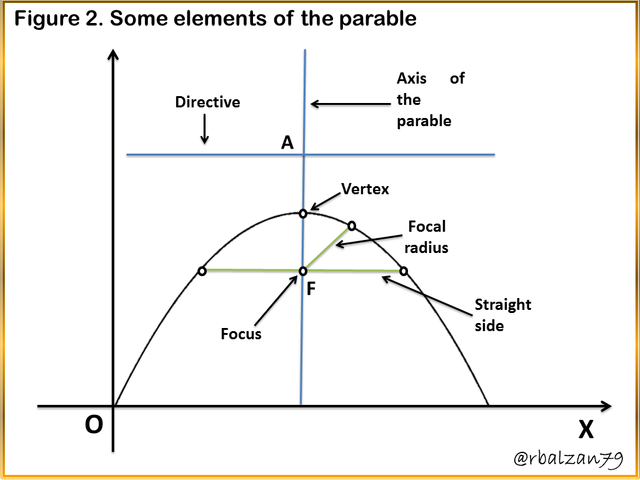
In Figure 2, we observe some elements that constitute a parabola, as well as the geometric place that gives rise to such a form, next we will know two types of parabolic movements, related to the amount of space or geometric place traveled by a certain mobile, by so much we have:
Complete parabolic movement
In this type of phenomenon we find those movements that are complete, that is, they cover the entire geometric place of a parabola as we will observe in the following figure 3.
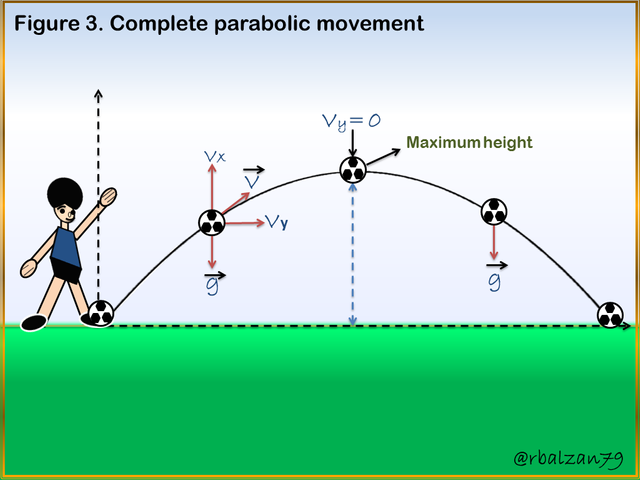
Half parable movement
In this type of mobility, a particular particle, body or object will begin its journey starting from the highest point (maximum height) of said complete parabolic path, that is, that it will travel half the geometric place of a parabola, therefore, said object is launched with a horizontal force of the form as we will visualize in the following figure 4.
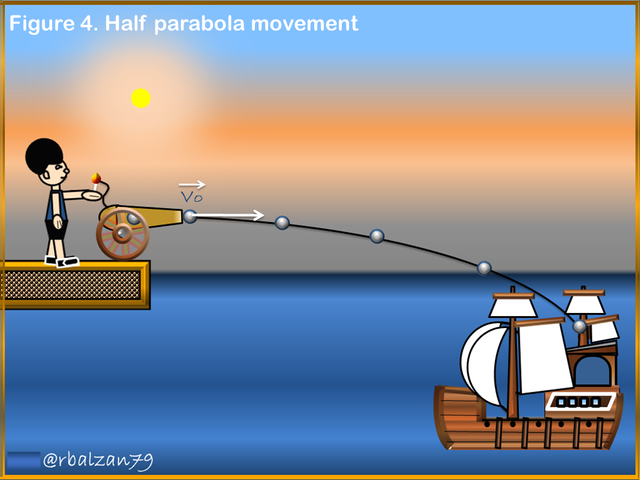
Other parabolic movements
This type of movement has many particular cases, because it does not describe a parabola from the ground, therefore we could express that it can start from a certain non-standard height, an example is when we observe a Basketball player trying to introduce the ball in the basket, we note that said ball starts at a height (x) from the ground, and this is because not all players are the same height, the truth is that the ball will travel a parabola from the moment it leaves the hands of the player until making contact with either the hoop or the mesh, as we can see in figure 5.
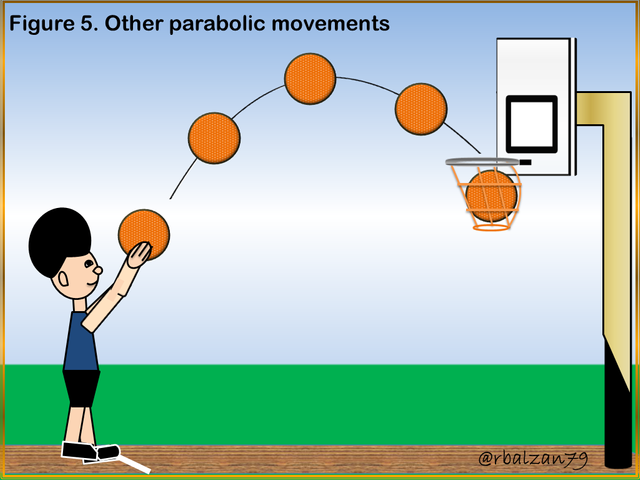
For this movement it is important to be able to relate to the general description of some formulations for certain physical quantities, which clearly influence the development of said parabolic movement, therefore we have:
Initial velocity
In a parabolic movement the initial velocity (VO) of a particular particle, body or object will have two components, one corresponding to the X axis, that is, horizontal and another corresponding to the Y axis, called vertical component as we will quickly see in the following figure 6.
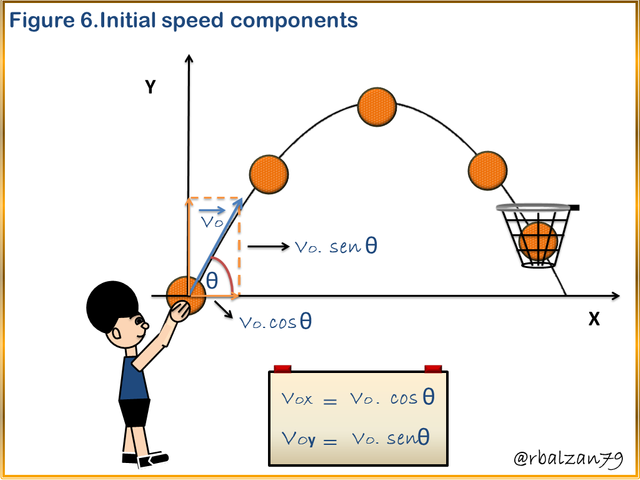
In this way we can consider that the parabolic movement is composed of two movements, one horizontal uniform whose speed is represented by Vox, and another vertical where the body with an initial speed represented by Voy rises vertically reaching a maximum height and then falls into free fall, therefore, we can express that this last (vertical) movement will be equal to the ascent and descent of any object thrown vertically upwards.
Max height
As we have seen in the previous figures, this represents the highest point of the path of a certain complete parabolic movement, therefore, in order to calculate its value we can implement the following formulation:
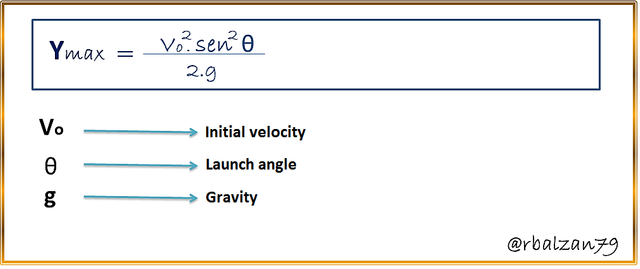
The maximum height is the exact point where a particular particle, body or object after being launched begins to fall or descend, any person could detect this point with the naked eye, and many are the daily examples related to said physical magnitude.
Flight time
The time required by a body or object from the moment it leaves until it falls into a parabolic movement, the so-called flight time, which is represented by the duration of the vertical movement of both ascent and descent, in a nutshell twice as much what would last for example the ascent movement, where it is involved as we know the action of gravity, therefore, below we have its algebraic formulation:

Science has shown us thanks to gravitational action that everything that goes up must fall, and the parabolic movement represents one of these examples, although some objects fall faster than others, in the end the result is the same, they all end up in the earth's crust, of course as long as such particle, body or object when launched does not exceed the escape velocity in relation to the action of the earth's gravitational field.
conclusion
The science of movement, that is, kinematics, has undoubtedly allowed us to be in clear harmony with the fabulous and vital phenomenon of the movement in general, and this scientific branch, as we could see, is based on the essential geometric shapes or figures that designate the characteristics of the type of movement to study and analyze.
Many relate this type of parabolic movement only from the point of view of ballistics, however, we could see in each of the analyzed examples, that its application is very extensive as an essential part of our daily activities.
It is important to emphasize that such mobility for its understanding requires the understanding and help of the well-known algebraic expressions, because they allow us to inject universality or generality to any type of knowledge essentially extracted from our environment in favor of man.
Countless objects that we observe in our environment could represent the shape of a parabola, this allows the implementation of this geometric figure in our lives to be very wide, and therefore, this allowed a great interest of man towards the parable and especially when It is used for the description of the movement we know as parabolic.
Our eyes can constantly visualize a parabolic-type movement, either describing half or a complete parabola, such as the examples presented in Figures 3 and 4, but this phenomenon could also leave our hands towards any point of arrival such as the example. of figure 5.
In this publication we met in a general way another type of curvilinear movement, such as the parabolic movement, a phenomenon well known to all of us, where, we can say that in the sports area we find more practical examples related to the trajectory of this movement type.
Until another time, my esteemed readers of steemit, especially the members of the great #steemstem community, for which I highly recommend being part of this beautiful project, as it highlights the valuable work of the academy and the scientific field. Note: All images were made using the Paint, Power Point, GeoGebra and gif applications with the PhotoScape application.
Note: All images were made using the Paint, Power Point, GeoGebra and gif applications with the PhotoScape application.
Bibliographic references
[1] Charles H. Lehmann. Analytic geometry.
[2] Lior M. Burko and Richard H. Price. Department of Physics, University of Utah, Salt Lake City.
[3] Snapper, E., Troyer, R.J. Metric Affine Geometry. Dover, New York, 1971.
[4] Gordon, Russ. Rev. of ”Some Real Analysis behind Optimization of Projectile Motion”, by Robert Kantrowitz and Michael M. Neumann. Mediterr. J. Math. 11(4) (2014).
[5] Taylor, J. R. (2005). Classical mechanics. University Science Books.
[6] Physics for Science and Engineering. Raymond A. Serway, Robert J. Beichner.
[7] Arroyave Valencia, Carlos. Movimiento Parabólico. Instituto Técnico Industrial Pascual Bravo.
This post has been voted on by the SteemSTEM curation team and voting trail. It is elligible for support from @curie and @minnowbooster.
If you appreciate the work we are doing, then consider supporting our witness @stem.witness. Additional witness support to the curie witness would be appreciated as well.
For additional information please join us on the SteemSTEM discord and to get to know the rest of the community!
Thanks for having used the steemstem.io app and included @steemstem in the list of beneficiaries of this post. This granted you a stronger support from SteemSTEM.
Thanks for the support community.
To listen to the audio version of this article click on the play image.

Brought to you by @tts. If you find it useful please consider upvoting this reply.
Thanks for the support.
Have a nice day, @rbalzan79.Your post was selected to win some extra TLNT tokens, powered by The Talent Club.That means you got talent!Enjoy it!Thanks for the support community.